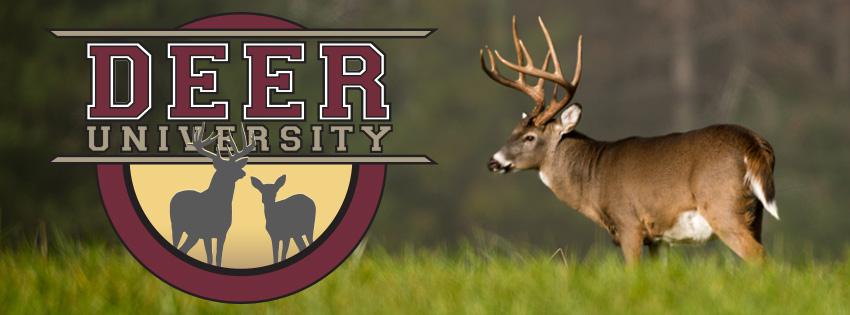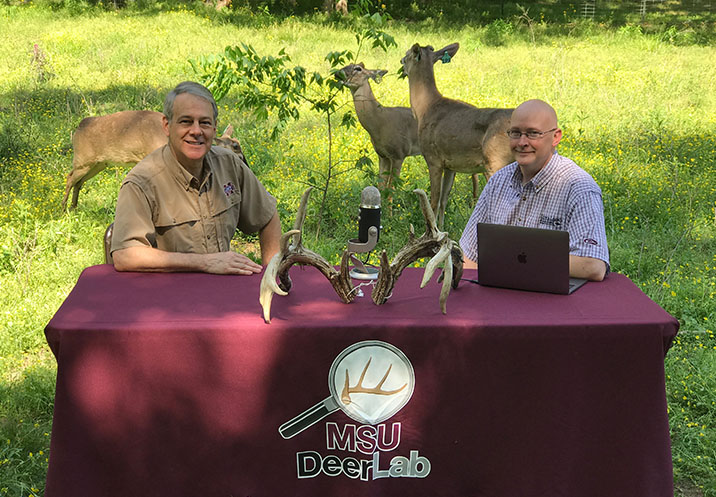Deer University


recording a Deer University podcast
Deer University podcasts are all about deer biology and management. Drs. Bronson Strickland and Steve Demarais are both deer hunters, deer biologists, professors of wildlife management, and co-directors of the Mississippi State University Deer Lab. Steve and Bronson are so crazy about deer biology and management that they made it their career!
Our goal is to explain how you can use deer research to improve your hunting and management experiences. Don’t take for granted what your buddy says or what you read in a hunting magazine – we’ll train you to think like a deer biologist. As national leaders in deer research, we’ll keep you up to date on the latest and best information, and deliver episodes that cover every deer management topic you can imagine, and then add some that will surprise you.
If you are interested in deer hunting and management, this is your podcast! Every shot you take this fall is either a step forward or backward in your management program, so use our knowledge to make every shot count!
Hosts of Deer University:
Dr. Bronson Strickland, Professor of Wildlife Management, Mississippi State University Extension Service
Dr. Steve Demarais, Professor of Wildlife Management, Mississippi State University Forest and Wildlife Research Center
Listen
Natasha Neary, Luke Resop, Steve Demarais, and Bronson Strickland delve into the relationships between moon phases, positions, and their potential effects on buck movement and bedding behavior. They review their research findings from a complex and exhaustive analysis of GPS-collared bucks to determine if moon phase and/or position has any relationship with buck movement behaviors. They emphasize the importance of accounting for individual buck personalities and behaviors during the rut and highlight the challenges in drawing definitive conclusions. The discussion also includes insights from a survey of hunters to gauge beliefs and expectations of the moon’s role in stimulating buck movement, and the implications of various lunar theories. The conversation highlights the complexity of deer behavior and the importance of data-driven insights to understand these patterns.
Check out the MSU Deer Lab’s online seminar series (here) and choose the Natural Resources option from the Categories drop down menu. You will have to create an account to view the seminars. The seminars are free unless you are seeking professional educational credits.
Also, be sure to visit our YouTube channel (here)
In this third episode with Dr. Mark Turner, we discuss Mark's research exploring the factors that contribute to the variation in population-level buck antler size. He explains that deer tend to be larger in areas further north due to heat retention and dissipation. He also highlights the importance of landscape characteristics, such as row crop agriculture, in influencing deer size. Additionally, he emphasizes the significance of managing forage availability on individual properties, including improving early successional plant communities and implementing holistic food plotting approaches. Overall, the key takeaways are the importance of considering the context of a property within the larger landscape, the potential for incremental improvements in deer management, and the need to manage both habitat and deer density to optimize deer quality.
Check out the MSU Deer Lab’s online seminar series (here) and choose the Natural Resources option from the Categories drop down menu. You will have to create an account to view the seminars. The seminars are free unless you are seeking professional educational credits.
Also, be sure to visit our YouTube channel (here)
Takeaways
Deer tend to be larger in areas further north due to heat retention and dissipation.
Row crop agriculture and early successional plant communities are positively associated with deer size.
Managing forage availability on individual properties can lead to significant improvements in deer quality.
Improving early successional plant communities and implementing holistic food plotting approaches are effective strategies for increasing forage availability.
Managing both habitat and deer density is crucial for optimizing deer quality.
In this episode, Dr. Mark Turner discusses his research on the nutrient requirements of deer and the availability of native plants to fulfill those requirements. He sampled common deer forages throughout the Eastern US and found that only 44% of the forages sampled met the minimum crude protein requirement, and only 19% met the minimum phosphorus requirement. This highlights the importance of providing a diverse range of forage options for deer. Mark also emphasizes the need to consider both the amount and quality of forage when estimating nutritional carrying capacity. He suggests that landowners consider incorporating native plants into their management strategies and diversify their food plots to provide a more balanced diet for deer. And Steve may have rambled a little too.
Takeaways
Providing a diverse range of forage options is important for meeting the nutrient requirements of deer.
Only 44% of the forages sampled met the minimum crude protein requirement, and only 19% met the minimum phosphorus requirement.
Estimating nutritional carrying capacity requires considering both the amount and quality of forage available.
Incorporating native plants into management strategies can help provide a more balanced diet for deer.
Diversifying food plots can also contribute to meeting the nutritional needs of deer.
Sound Bites
"Diversify your habitat and then let them do their job"
"Deer have pretty high phosphorus requirements and a lot of the plants are not meeting that requirement"
"Deer develop an aversion to forages that are very high in nutrients they already have"
Check out the MSU Deer Lab’s online seminar series (here) and choose the Natural Resources option from the Categories drop down menu. You will have to create an account to view the seminars. The seminars are free unless you are seeking professional educational credits.
Also, be sure to visit our YouTube channel (here)
In this conversation, Bronson, Steve, and Mark Turner discuss the relationship between doe body weight and buck antler size. Mark's research at the University of Tennessee aimed to evaluate how deer body and antler size varied across the eastern US and what habitat characteristics were associated with bigger deer. The results showed a consistent relationship between doe body weight and buck antler size, with an 8.5-inch increase in antler size for every 10-pound increase in doe body mass. This relationship provides a predictive equation that can help property managers and hunters assess and improve buck antler size by focusing on increasing doe body weight. The conversation also includes topics like harvest bias, compositional bias, and monitoring techniques.
Check out the MSU Deer Lab’s online seminar series (here) and choose the Natural Resources option from the Categories drop down menu. You will have to create an account to view the seminars. The seminars are free unless you are seeking professional educational credits.
Also, be sure to visit our YouTube channel (here)
Takeaways:
There is a consistent relationship between doe body weight and adult buck antler size, with an 8.5-inch increase in antler size for every 10-pound increase in doe body weight.
Increasing doe body weight can lead to larger buck antler size, providing a predictive equation for property managers and hunters to assess and improve antler size.
Harvest bias and compositional bias can affect the accuracy of data collected on deer populations, and monitoring techniques should account for these biases.
Understanding the relationship between doe body weight and buck antler size can help property managers and hunters make informed decisions about deer management and habitat improvement.
Further research is needed to explore the variation in doe body weight and antler size across different regions and climates.
Sound Bites:
"If you can produce 120-inch does, your average mature male is gonna be 139 inches."
"When you give them food and manage the habitat, doe body weights respond, bucks respond, antlers respond."
"If you're not seeing the size of deer that you think you should be seeing, it may be that pulling the trigger is the issue."
In this conversation, Bronson, Steve, and Mark Turner discuss the relationship between doe body weight and buck antler size. Mark's research at the University of Tennessee aimed to evaluate how deer body and antler size varied across the eastern US and what habitat characteristics were associated with bigger deer. The results showed a consistent relationship between doe body weight and buck antler size, with an 8.5-inch increase in antler size for every 10-pound increase in doe body mass. This relationship provides a predictive equation that can help property managers and hunters assess and improve buck antler size by focusing on increasing doe body weight. The conversation also includes topics like harvest bias, compositional bias, and monitoring techniques.
Check out the MSU Deer Lab’s online seminar series (here) and choose the Natural Resources option from the Categories drop down menu. You will have to create an account to view the seminars. The seminars are free unless you are seeking professional educational credits.
Also, be sure to visit our YouTube channel (here)
Takeaways:
There is a consistent relationship between doe body weight and adult buck antler size, with an 8.5-inch increase in antler size for every 10-pound increase in doe body weight.
Increasing doe body weight can lead to larger buck antler size, providing a predictive equation for property managers and hunters to assess and improve antler size.
Harvest bias and compositional bias can affect the accuracy of data collected on deer populations, and monitoring techniques should account for these biases.
Understanding the relationship between doe body weight and buck antler size can help property managers and hunters make informed decisions about deer management and habitat improvement.
Further research is needed to explore the variation in doe body weight and antler size across different regions and climates.
Sound Bites:
"If you can produce 120-inch does, your average mature male is gonna be 139 inches."
"When you give them food and manage the habitat, doe body weights respond, bucks respond, antlers respond."
"If you're not seeing the size of deer that you think you should be seeing, it may be that pulling the trigger is the issue."
